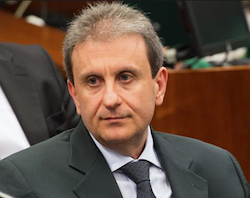The massive corruption scandal rocking Brazil is generating new controversy over the use of plea bargains, which prosecutors claim have proven indispensable in taking down an expansive criminal network, while critics argue the deals allow offenders to skirt justice.
Several individuals convicted in connection with “Operation Car Wash” have been granted dramatic reductions in prison time by cooperating with Brazilian authorities, Folha de São Paulo reported. In total, Folha’s analysis showed that thirteen defendants were able to reduce the collective prison time they would have served from more than 283 years to less than seven.
The “Car Wash” scheme involved executives at the state-run oil company Petrobras issuing inflated construction contracts in exchange for bribes and kickbacks, some of which were laundered and funneled into political campaigns. According to Folha, a number of the ringleaders of the operation were able to reduce their sentences from decades in prison to just a few years, while others will serve no time in exchange for the information they provided.
One of the most prominent examples is Alberto Youssef, who laundered funds for participants in the scheme. Originally facing up to 30 years in prison, Youssef reduced his sentence to just three years by providing information on other suspects.
The fallout from the “Car Wash” scandal has ensnared former top executives at Petrobras, as well as political power brokers. And, as InSight Crime previously reported, it has even threatened to implicate Brazilian president Dilma Rousseff, who served as chairwoman of the oil company during the time when investigators say much of the corruption took place.
InSight Crime
A federal prosecutor on the “Car Wash” task force, Deltan Dallagnol, defended the use of plea bargains in comments to Folha. “The collaborations are made to achieve evidence in relation to several other people, including criminals with more relevant roles in the crime, and to recover diverted money,” he said, adding that 40 such agreements had yielded charges against 179 other suspects.
On the other hand, Antônio Cláudio Mariz de Oliveira, the former attorney of one of the defendants who took a plea deal, called the practice “an institution of dubious legality and legitimacy.” Mariz argued that plea bargains give “absolute credibility to the word of the informer, who is actually informing purely and simply to avoid prison.”
Both lawyers have a point.
In other corruption cases involving elites in Latin America, defendants have tended to close ranks and protect one another by staying silent. But in the case of the “Car Wash” investigations, the incentive of reduced prison time in exchange for information has helped prosecutors build cases against a vast network of corrupt businesspeople and politicians.
SEE ALSO: Coverage of Elites and Organized Crime
At the same time, these reductions can be taken too far. The sizeable decrease — and in some cases elimination — of prison time for high-profile defendants can lead to the impression that information can buy impunity for serious crimes. The US justice system, which makes extensive use of plea bargains in organized crime cases, has come under criticism for similar reasons.
The results of plea deals don’t always satisfy public clamor for justice, but in some cases, like the “Car Wash” scandal, they can help dismantle powerful criminal networks. And that process can lead to broader shifts in societal attitudes toward corruption, as has been seen in Guatemala where the revelation of a customs fraud scheme sparked a mass anti-corruption movement that helped oust one president before sweeping another into power.
In Brazil, where recent surveys show citizens rank corruption at the top of the list of their country’s problems, the “Car Wash” scandal could prove to be a similar turning point.

